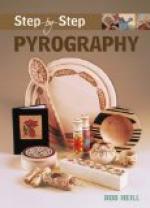To Ye whom my children, born here
in my mansion,
Reverence beyond the gods of their fathers,
And love as they love their own mother,
Gods of the Land, I build ye this temple!
XII
COLD HARBOR
Wilfrid, the potter, stood with his wife and children, looking at what was left of a little old cottage. Fire had left it a heap of ashes and half-burned timbers and rubbish. The red roof-tiles glowed like embers of dead centuries.
“I’d never ha’ turned the old man out,” he said pensively, “but now he’s gone and the cot’s gone too, we’ll see what’s under this end of Cold Harbor.”
Edwitha, his wife, looked up, her eyes sparkling through quick tears.
“I was hoping you’d say that, Wilfrid,” she said with eager wistfulness. “I’ve longed so to know—but he’d lived there since our fathers and mothers were children. ‘Twould ha’ been like taking the soul out of his body to drive him away.”
She was a slender, pretty creature, almost as childlike in her way of speaking as if she had been no older than Dorothea or Alfred. The children listened with pleased excitement commingled with a certain awe. Gaffer Bartram had seemed as much a part of their lives as the sun or the wind or the old pollard willow. When he was strong enough he taught Alfred to snare rabbits and catch moles; when rheumatism crippled him he sat by the door making baskets and telling Dorothy rhymes and tales of seventy years ago. Then first his old gray cat Susan had disappeared, after that the old man himself, and last the cottage caught fire and burned. And father was actually giving orders to the men to dig up the garden and see what lay under it.
There is a mysterious immovable setness about the Sussex Downs. What is there seems to have been there always. The oldest man cannot say when the great white hollows were first scooped out of the chalk, or the dewponds made on the heights. Ever since there were people in Sussex—whether it is five thousand years ago or fifteen thousand—the short wind-swept turf has been grazed by woolly flocks. Before ever a Norman castle held a vantage-height the tansy grew dark and rank in cottage gardens and the children went gathering woodruff and speedwell and the elfin gold of “little socks and shoes.” Any change, good or bad, is a loss to some one—the land is so full of the life of the past.
Wilfrid and Edwitha well understood this, though they would never have put it into fine phrases. They could not have said it except to each other, and for that there was no need of speech. Because of it they had left the old man at peace in his cottage, and even after he was dead they put off the uncovering of what might lie under the soil of his garden and his orchard.
Wilfrid’s pottery had grown up in the last ten years near a claybank, not far from the boundary between his father’s land and Edwitha’s old home. An irregular terrace broke the slope above it, and here the tilled land had come to an end at one point because the plows came hard against a buried Roman wall. Not being able to break up the solid masonry of Roman builders done a thousand years before, Wilfrid’s father had cleared away the soil, roofed over the ruin which he found, and used it to store grain. This was Cold Harbor.




